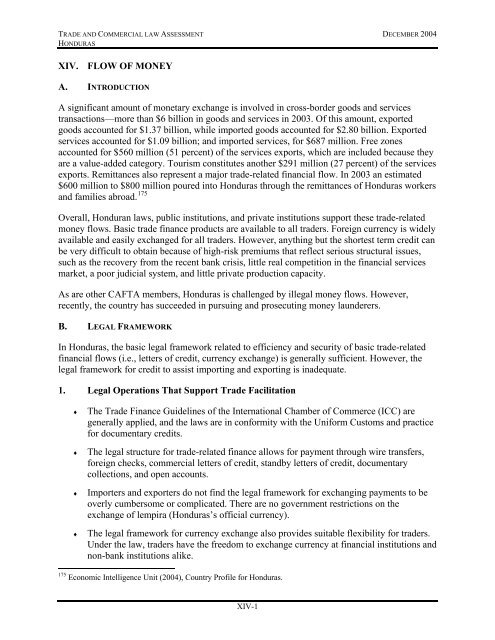Trade and Commercial Law Assessment - Honduras - Economic ...
Trade and Commercial Law Assessment - Honduras - Economic ...
Trade and Commercial Law Assessment - Honduras - Economic ...
You also want an ePaper? Increase the reach of your titles
YUMPU automatically turns print PDFs into web optimized ePapers that Google loves.
TRADE AND COMMERCIAL LAW ASSESSMENT DECEMBER 2004<br />
HONDURAS<br />
XIV. FLOW OF MONEY<br />
A. INTRODUCTION<br />
A significant amount of monetary exchange is involved in cross-border goods <strong>and</strong> services<br />
transactions—more than $6 billion in goods <strong>and</strong> services in 2003. Of this amount, exported<br />
goo<br />
services accounted for $1.09 billion; <strong>and</strong> imported services, for $687 million. Free zones<br />
acc<br />
are a va ent) of the services<br />
xports. Remittances also represent a major trade-related financial flow. In 2003 an estimated<br />
600 million to $800 million poured into <strong>Honduras</strong> through the remittances of <strong>Honduras</strong> workers<br />
<strong>and</strong> families abroad. 175<br />
ds accounted for $1.37 billion, while imported goods accounted for $2.80 billion. Exported<br />
ounted for $560 million (51 percent) of the services exports, which are included because they<br />
lue-added category. Tourism constitutes another $291 million (27 perc<br />
e<br />
$<br />
Overall, Honduran laws, public institutions, <strong>and</strong> private institutions support these trade-related<br />
money flows. Basic trade finance products are available to all traders. Foreign currency is widely<br />
available <strong>and</strong> easily exchanged for all traders. However, anything but the shortest term credit can<br />
be very difficult to obtain because of high-risk premiums that reflect serious structural issues,<br />
such as the recovery from the recent bank crisis, little real competition in the financial services<br />
market, a poor judicial system, <strong>and</strong> little private production capacity.<br />
As are other CAFTA members, <strong>Honduras</strong> is challenged by illegal money flows. However,<br />
recently, the country has succeeded in pursuing <strong>and</strong> prosecuting money launderers.<br />
B. LEGAL FRAMEWORK<br />
In <strong>Honduras</strong>, the basic legal framework related to efficiency <strong>and</strong> security of basic trade-related<br />
financial flows (i.e., letters of credit, currency exchange) is generally sufficient. However, the<br />
legal framework for credit to assist importing <strong>and</strong> exporting is inadequate.<br />
1. Legal Operations That Support <strong>Trade</strong> Facilitation<br />
♦ The <strong>Trade</strong> Finance Guidelines of the International Chamber of Commerce (ICC) are<br />
generally applied, <strong>and</strong> the laws are in conformity with the Uniform Customs <strong>and</strong> practice<br />
for documentary credits.<br />
♦ The legal structure for trade-related finance allows for payment through wire transfers,<br />
foreign checks, commercial letters of credit, st<strong>and</strong>by letters of credit, documentary<br />
collections, <strong>and</strong> open accounts.<br />
♦ Importers <strong>and</strong> exporters do not find the legal framework for exchanging payments to be<br />
overly cumbersome or complicated. There are no government restrictions on the<br />
exchange of lempira (<strong>Honduras</strong>’s official currency).<br />
♦ The legal framework for currency exchange also provides suitable flexibility for traders.<br />
Under the law, traders have the freedom to exchange currency at financial institutions <strong>and</strong><br />
non-bank institutions alike.<br />
175 <strong>Economic</strong> Intelligence Unit (2004), Country Profile for <strong>Honduras</strong>.<br />
XIV-1

















